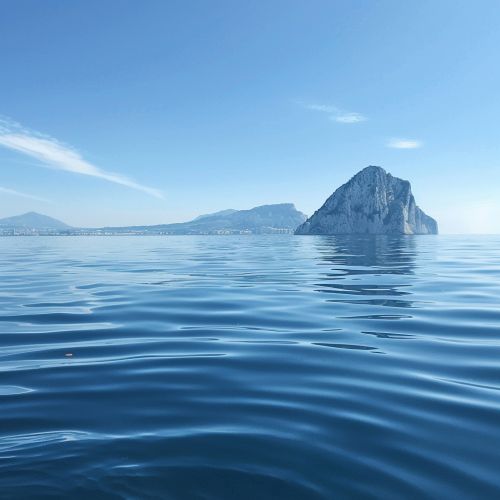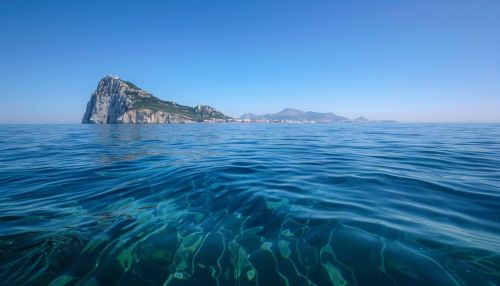History of Gibraltar
Early History
Gibraltar, a small British Overseas Territory located at the southern tip of the Iberian Peninsula, has a rich and complex history that spans several millennia. The earliest known inhabitants of Gibraltar were the Neanderthals, who occupied the region approximately 50,000 years ago. Archaeological evidence, including the discovery of Neanderthal skulls and other artifacts in Gorham's Cave, provides insight into their existence and lifestyle.
The Phoenicians, an ancient Semitic-speaking civilization from the Levant, were among the first to establish a significant presence in Gibraltar around 950 BCE. They used the region as a strategic trading post due to its location at the entrance to the Mediterranean Sea. The Carthaginians, who succeeded the Phoenicians, continued to utilize Gibraltar for similar purposes.
Roman Period
The Romans took control of Gibraltar following the defeat of Carthage in the Punic Wars. Under Roman rule, Gibraltar became part of the province of Hispania Baetica. The Romans referred to the Rock of Gibraltar as "Mons Calpe," one of the Pillars of Hercules, which marked the boundary of the known world. The strategic importance of Gibraltar was recognized by the Romans, who established a small settlement and military outpost in the area.
Medieval Era
Visigothic and Byzantine Rule
After the fall of the Western Roman Empire, Gibraltar came under the control of the Visigoths, a Germanic tribe that ruled much of the Iberian Peninsula. The Visigothic period in Gibraltar was relatively brief, as the region was soon conquered by the Byzantine Empire in the 6th century. The Byzantines fortified Gibraltar and used it as a naval base to protect their interests in the western Mediterranean.
Islamic Conquest
In 711 CE, Gibraltar was captured by the Umayyad Caliphate during the Islamic conquest of the Iberian Peninsula. The name "Gibraltar" is derived from the Arabic "Jabal Tariq," meaning "Mountain of Tariq," named after the Berber general Tariq ibn Ziyad who led the invasion. The Moors, as the Muslim conquerors were known, established a fortress on the Rock of Gibraltar and used it as a base for further expansion into Europe.
The Reconquista
The Reconquista, a series of campaigns by Christian states to recapture territory from the Moors, significantly impacted Gibraltar. In 1309, Gibraltar was briefly captured by the Kingdom of Castile, but it was retaken by the Moors in 1333. It was not until 1462 that Gibraltar was permanently captured by the forces of the Duke of Medina Sidonia, marking the end of Muslim rule in the region.
Early Modern Period
Spanish Rule
Following the Reconquista, Gibraltar became part of the Kingdom of Castile and later the unified Kingdom of Spain. The Spanish recognized the strategic importance of Gibraltar and fortified the area extensively. During this period, Gibraltar served as a key naval base and trading post, facilitating Spain's maritime ambitions.
The War of Spanish Succession
The War of Spanish Succession (1701-1714) was a pivotal moment in Gibraltar's history. In 1704, an Anglo-Dutch fleet captured Gibraltar on behalf of the Habsburg claimant to the Spanish throne. The Treaty of Utrecht, signed in 1713, officially ceded Gibraltar to Great Britain, although Spain made several attempts to recapture it in the ensuing years.
British Rule
18th and 19th Centuries
Under British rule, Gibraltar's strategic importance continued to grow. The British fortified the Rock extensively, constructing a network of tunnels and defensive structures. Gibraltar played a crucial role during the American War of Independence and the Napoleonic Wars, serving as a base for the Royal Navy.


The Great Siege
One of the most significant events in Gibraltar's history was the Great Siege of 1779-1783. During this period, Spanish and French forces attempted to recapture Gibraltar from the British. Despite being heavily outnumbered and facing severe hardships, the British garrison successfully defended Gibraltar, solidifying British control over the territory.
19th Century Developments
The 19th century saw significant developments in Gibraltar, including the construction of new fortifications and the establishment of a civilian population. The opening of the Suez Canal in 1869 further increased Gibraltar's strategic importance, as it became a key stopover point for ships traveling between Europe and Asia.
20th Century
World War I and Interwar Period
During World War I, Gibraltar served as a vital naval base for the Allies, protecting shipping routes and supporting military operations in the Mediterranean. The interwar period saw continued investment in Gibraltar's infrastructure, including the construction of an airfield and improvements to the port facilities.
World War II
World War II was a defining period for Gibraltar. The territory was heavily fortified, and its civilian population was evacuated to the United Kingdom, Jamaica, and Madeira to make way for military operations. Gibraltar played a crucial role in Operation Torch, the Allied invasion of North Africa, and served as a base for anti-submarine warfare in the Atlantic.
Post-War Period
After World War II, Gibraltar's strategic importance diminished somewhat with the advent of new military technologies. However, it remained an important military base and a symbol of British presence in the Mediterranean. The post-war period also saw significant political developments, including the establishment of a civilian government and the granting of British citizenship to Gibraltarians.
Modern Era
Decolonization and Self-Determination
The latter half of the 20th century was marked by tensions between the United Kingdom and Spain over the status of Gibraltar. In 1967, a referendum was held in which the people of Gibraltar overwhelmingly voted to remain under British sovereignty. This led to the closure of the border with Spain, which remained shut until 1985.
Economic Development
In recent decades, Gibraltar has transformed its economy, moving away from a reliance on military spending to become a thriving financial center and tourist destination. The territory has developed a robust financial services sector, benefiting from its favorable tax regime and regulatory environment.
Brexit and Future Challenges
The United Kingdom's decision to leave the European Union (Brexit) has presented new challenges for Gibraltar. The territory, which voted overwhelmingly to remain in the EU, faces uncertainties regarding its future relationship with both the UK and the EU. Ongoing negotiations and diplomatic efforts aim to address these challenges and ensure Gibraltar's continued prosperity.
